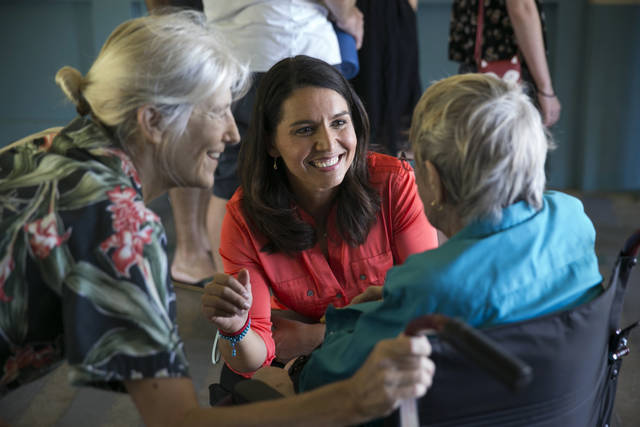On Politics: As with Ed Case, Democratic Party’s political trust of Tulsi Gabbard won’t come easy

ASSOCIATED PRESS / 2016
Rep. Tulsi Gabbard, D-Hawaii, center, greets voters as she waits with others to vote in the Democratic presidential caucus at a polling station at Kailua Intermediate School in Kailua. Gabbard is now running for president.
Not since 2006, when Ed Case tried to knock off then-sitting U.S. Sen. Dan Akaka, has there been such a discordant spirit in Hawaii’s tiny four-person congressional delegation.
It was 13 years ago when Case, after months of coy refusals to specifically say if he would challenge Akaka, jumped into the U.S. Senate race.
If Case thought that progressive, reform-minded or young members of the Democratic Party would rally to his cause, he was mistaken. On primary election night, Akaka watched his 10 percentage point victory roll over Case, saying his campaign “united the Democratic Party.”
The Case campaign stood not so much as a challenge from young reformers, as a statement by Case repudiating all the work done by Democratic traditionalists and party workers.
While not turned out of the party, Case has just returned to Congress in the House, but he is still mistrusted by many mainstream Hawaii Democrats.
That’s an important lesson because now, popular Hawaii Democrat U.S. Rep. Tulsi Gabbard has the same trust issues as she toys with a campaign for president. To that end, she has started attacking Hawaii U.S. Sen. Mazie Hirono.
Don't miss out on what's happening!
Stay in touch with breaking news, as it happens, conveniently in your email inbox. It's FREE!
Political unity has never been the same as “one for all and all for one,” but when you start throwing campaign fastballs, you’d better make sure you can control them.
Last week Gabbard accused Hirono and U.S. Sen. Kamala Harris (D-Calif.) of religious bigotry, saying in an opinion piece in the Capitol newspaper The Hill that some senators have gone too far in their questioning of Brian Buescher, whom President Donald Trump nominated in October to serve as a district judge.
“While I oppose the nomination of Brian Buescher to the U.S. District Court in Nebraska, I stand strongly against those who are fomenting religious bigotry,” Gabbard said, pointing out that she thought Hirono said he was disqualified because of Buescher’s Catholicism and his affiliation with the Knights of Columbus.
The Knights have contributed millions of dollars directly to campaigns to stop the legalization of gay marriage and channeling money through other Catholic groups, according to a report by DignityUSA, an organization of gay Catholics and the Human Rights Campaign, one of four advocacy groups that compiled the research, reported The Washington Post.
Hirono, who was expecting Gabbard to run against her in last year’s Democratic primary, knows she couldn’t let Gabbard’s new attack go unanswered.
“It is unfortunate that Congresswoman Gabbard based her misguided opinion on the far-right wing manipulation of these straightforward questions,” Hirono spokesman Will Dempster said in a statement.
Responding, Gabbard spokeswoman Lauren McIlvaine said Gabbard will “always fight for religious freedom and oppose religious bigotry — no matter where it comes from or to whom it’s directed.”
In an exhaustive 2017 New Yorker magazine article entitled “What Does Tulsi Gabbard Believe?” author Kelefa Sanneh explored Gabbard’s past when she was an “outspoken social conservative, pro-life and active in the fight against same-sex marriage.”
Gabbard has since said she is pro-choice and pro-same-sex marriage and is a House member of the LGBT Equality Caucus, saying: “The government should not deny those in same-sex relationships the right to marry and enjoy the same benefits, rights, and responsibilities as opposite-sex married couples.”
While Gabbard changed her position on gay marriage, Hirono, one of the early, strong supporters of gay marriage and progressive issues, has always been passionate and unapologetic in her support. She once joked that while she is the first Asian-American woman in the Senate, an immigrant and a Buddhist, when asked if “Are you gay?” she answered, “Nobody’s perfect.”
For Gabbard, much like Case, political trust is not assumed; it is still something measured daily.
Richard Borreca writes on politics on Sundays. Reach him at 808onpolitics@gmail.com.




